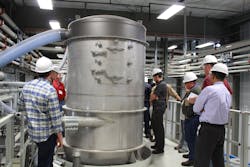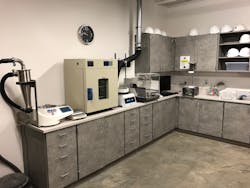Bulk Solids Innovation Center helps fill gap in powder and bulk solids education
Handling and processing powders and bulk solid materials is very different from handling liquids. Each material has unique characteristics, and problems such as poor flow, segregation and particle degradation can be costly and challenging to overcome. However, companies must solve these problems to meet production requirements and product quality standards and prevent costly downtime.
The Kansas State University Bulk Solids Innovation Center (BSIC) in Salina, Kansas, was created to help companies facing such challenges. The BSIC was formed as a partnership between the university, state and local government agencies, the U.S. Department of Commerce Economic Development Administration and several private companies to study bulk solids handling and serve as a resource for companies that design and use bulk solids handling equipment.
Todd Smith, Processing’s newest editorial advisory board member, has managed the BSIC since 2019 and was previously the general manager of Coperion K-Tron, Salina. Recently, we spoke with Todd about the BSIC and issues facing companies that handle and process powders and bulk solids.
Why was the BSIC created?
Over the last 40 years, I have had many discussions with industry associates about important aspects of education and research that are missing in our area of technology. Bulk solids handling and processing isn’t taught in college. Most major companies have shut down their testing labs. The same handling and processing issues keep reoccurring. Technological improvements are slow in the making, and information is poorly disseminated. So about ten years ago, a small group of industry associates approached Kansas State University about leading the innovation effort. It took a few years to get it figured out, but then the BSIC was built six years ago.
The mission of the BSIC is to improve the state of the art and help industry with the challenges of handling and processing powder and bulk solid materials.
What services does the BSIC provide to companies that handle bulk solids?
We provide three main services: 1) Education classes for industry personnel, 2) Material testing to determine material characteristics and 3) Research and consulting projects.
What equipment and capabilities are available at the center for material testing or troubleshooting?
We have a two-story, 13,000-square-foot facility with a large test bay and six laboratory rooms for university- and industry-sponsored research. We have material testing equipment and knowledge to solve problems having to do with material storage and gravity flow, conveying, dust filtration and other processes. And we have full-scale equipment with many configurations to evaluate options, verify concepts and experiment with new methods and equipment.
Why is independent material testing important, and what can companies learn about their materials?
Most companies can’t afford to have all the necessary testing equipment and expertise in-house, so it makes sense to engage an independent authority who can provide those services when needed. In addition, companies often need help scaling up from lab or pilot scale to production, and they can’t shut down their own production to figure it out. That’s why we’re here.
How has the center or its services evolved since it opened?
It has been fun helping a huge variety of industries and applications with fundamental issues. For example, getting material to flow reliably is a fascinating challenge that affects almost every company. Another evolution has been with our education. Our class participants love hands-on learning, so now our classes typically involve about one-half lecture, with the remaining time spent with real equipment and materials. I have also been surprised and pleased about how many companies want us to help develop project specs or evaluate bids — I think they value having an independent expert on their team.
How did the COVID-19 pandemic impact the center’s ability to operate, and what changes did you make to adapt?
We took internal safety measures and kept operating during the pandemic, providing critical material testing and video-conference consulting services for industry. Manufacturing companies didn’t shut down, so neither did we. Regarding education for industry, we switched to online classes and figured out how to keep classes interactive, with real-time equipment demonstrations, questions and discussion remaining a valuable part of each course. We have now changed back to in-person classes but can still do them online if companies desire.
What are some industry trends impacting companies that handle bulk solids or that may impact them in the future?
We see a lot of trends affecting companies. For example, hiring personnel is difficult, so reducing labor is a key to success. Automation of bulk solids handling is improving greatly, but it needs to be reliable. And all parts of the system must work in sync with the data collection and controls. New materials are being developed for applications such as battery production and additive manufacturing, and the materials keep getting more interesting and challenging. Safety and quality requirements continue to get stricter, and expertise is needed to help figure them out in a practical way.
Kansas State University Bulk Solids Innovation Center
607 Front St.
Salina, KS
785-576-2211
2022 Bulk Solids Innovation Center classes and industry services
The BSIC provides three primary services for industry: material properties testing, education classes and research and consulting projects. The following education classes are scheduled for 2022:
Storage & Flow of Bulk Solids February 8-10, 2022
Basics of Pneumatic Conveying April 19-20, 2022
Troubleshooting (Pneumatic Conveying & Air Filtration) June 14-15, 2022
Dust Hazards August 16-17, 2022
Materials Properties Testing and Results Application September 13-14, 2022
The BSIC also provides custom classes tailored to a company's specific needs. These customized classes can be held either at the BSIC or at the company’s site. Topics include:
- Material property tests and how to evaluate your materials
- Gravity flow and storage of bulk solids
- Design of silos and bins
- Mixing basics
- Segregation issues
- Dust collection and particulate air filtration: baghouses, filter receivers, cyclones, filter media, air emissions
- Safety when handling bulk solids
- Preventing dust explosions
- Pneumatic conveying: dilute phase, dense phase, vacuum sequencing
- Pneumatic conveying troubleshooting
- Working with vendors
- Project management and purchasing
- Milling, size reduction
- Screening, separation
- Airlock rotary valves
- Shut-off and control valves
- Feeding devices
- Air movers: blowers, fans, air compressors
- Weighing and batching
- Instrumentation and process control
Please visit bulk-solids.k-state.edu for more information or to register.



